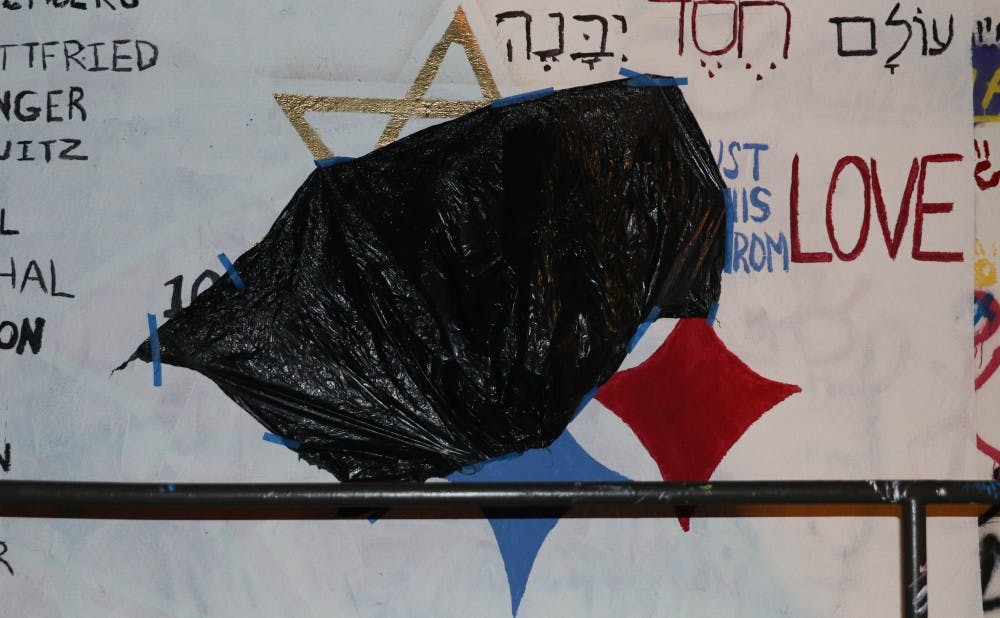Duke University has endured a series of racial epithets and symbols of domestic terrorism and white supremacy during my 22 years as a professor at Duke. This continued with the word "n*****" scrawled on the Mary Lou Williams Center for Black Culture just as the first-year students settled into their dorm this past August. More recently, anti-Semitic symbols have been left on campus, along with propaganda from a white supremacist group seeking to mainstream their hateful ideology.
These events invoke a mixture of anger, fear and exhaustion among historically marginalized and targeted groups on campus, and the anonymity of the attacks amplify those feelings, because if it could be anybody, it could be everybody. Roommate, hallmate, classmate, officemate, labmate, person on the bus beside me, at the table in the Brodhead Center having lunch, or a Durham resident unconnected to Duke looking at the produce in Harris Teeter on Ninth Street, and so on.
Duke’s location in the South, and our own history that is just beginning to be openly discussed and wrestled with, gives special potency to racial slurs, either those spoken against community members who are black, or those that tell others that they are not white. The noose hung on campus a few years back encapsulates four centuries of the black experience in our nation: treated first as captives and property and then as a freed people, who were simultaneously used by whites and treated as a mortal threat. Instead of spending the 50 years after the ratification of the 13th and 14th Amendments to the Constitution systematically establishing the full citizenship of freed slaves, we did the opposite, with violent fighting against reconstruction, state-sponsored terror against blacks, and the development of Jim Crow laws and more subtle but impenetrable social codes that served to keep whites in power, both politically and economically. Regardless of the intent of the person who hung the noose, its continued power as a symbol caused black members of our community to look over their shoulder in fear, or to wonder in exasperation what it will take to be acknowledged as vitally contributing to, and belonging at Duke. That time lost to anger, worry, fear and doubt—instead of studying, teaching or researching—is both a personal injury and a deprivation to our entire community.
Failure to fully reckon with our racial history is the original (and ongoing) sin of the United States, but it is not too late.
Anti-Semitism is a particularly virulent and pernicious form of hatred, which has managed to surface in most global or imperial cultures, across many centuries. The idea that a group of people could be exterminated is perhaps the original sin of human beings organized into social groups. As a Christian, I am aware that across the centuries of vicious deadly infighting among different sects and denominations, the one “doctrine” to which virtually all Christians subscribed was that the Jews were damned and should be shunned or destroyed. The emboldened expression of anti-Semitism and its joining with white supremacist ideology that we saw plainly displayed in Charlottesville, is bubbling all around and among us and our campus and nation are troubled.
Duke University is an intellectual, workplace and residential community that is struggling to find our collective voice to meaningfully address these symbols, slurs and threats of violence. Saying “this is not us” is obviously wrong; sadly, it has long been part of who we are. That part of our identity is deep, but it is not immutable.
What do we need to do next? First, we need to look out for each other where we find ourselves—in the dorms, offices, classrooms, labs, apartments and neighborhoods where we live and work and stand up with and for each other. Different groups that have been targeted need to join together with persons who may well be targeted in the future and try and find our collective voice that affirms both our humanity and scholarly pursuits. We need each other. There are many things that Duke does to keep students, faculty and staff safe, and there is ongoing discussion about what else can and should be done, but all of us need to be on alert. As a white man with power on campus, I think that I have extra responsibility to speak up, especially when no one is watching.
Second, we need a more active intellectual community at Duke that affirms the investigation and debate of ideas and the creation of knowledge, and also sets expectations for how this is done. Anonymous acts of cowardice have no place in a scholarly community. Hateful speech and slurs are asymmetric in impact, and serve to systematically truncate voices from historically marginalized groups. We should create space for all members of the community to make most any argument they wish, so long as they are willing to own and defend their words and engage in respectful dialogue. And if I expect others to listen to me, then I need to be prepared to listen to them. I believe that the faculty need to do more in leading and modelling this effort at Duke, and I stand ready to help.
If we as faculty, student and staff jointly assume responsibility to look out for each other, then the voice of an invigorated community will crowd out voices that are designed to terrorize or distract and replace them with the type of intellectual discourse that we want. In that way, we will build the Duke we want together and provide an example of how our country can move forward in these troubled and divided times.
Don Taylor is a professor in the Sanford School and Chair of the Academic Council. This piece represents his personal views.
Get The Chronicle straight to your inbox
Signup for our weekly newsletter. Cancel at any time.

